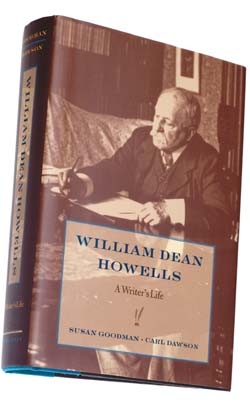 |
 |
| current issue |  |
past issues |  |
send a letter/news |  |
address update |  |
advertise |  |
about us |  |
alumni home |
Previews
Books, music, art, theater, film, and danceby Anne Downey '95G
Wentworth By the Sea: The Life and Times of a Grand Hotel By J. Dennis Robinson '73
William Dean Howells: A Writer's Life By Susan Goodman '72, '74G, '85G, '88G and Carl Dawson
Overviews:
Books:
Heather King '77
Margaret-Love Denman
Ginny Lowe Connors '73
Laurence French '68, '70G, '75G and Magdaleno Manzanarez
Mark Jeffrey '90Music:
Julie Hardy '99Film:
Bill Millios '88Also of Note...
Patricia Lynne Grace Cummings '73
R.S. Gwynn and April Lindner '84
Elizabeth Tornes '81G
Gael D. Ulrich and Palligarnai T. Vasudevan
Wentworth By the Sea: The Life and Times of a Grand Hotel
See at amazon.com

For those who watched the slow decay of the historic Wentworth by the Sea Hotel in New Castle, N.H., in the 1980s and '90s, it was impossible to feel anything but gratitude in the summer of 2001 when its renovation finally began. J. Dennis Robinson '73 understands the meaning of the hotel to the region; indeed, he describes his book as "emotional architecture," an attempt to "frame in—with feeling" the history of the hotel from its construction in 1873 until its reopening 130 years later. Its rich and distinctive history reflects the political and social changes of its era, as well as the unique personalities of the people whose dreams required them to build "the largest structure on the highest point of the smallest town in the state." Here, too, are compelling stories of the preservationists, the numerous people who, despite overwhelming odds, wouldn't let the place go down.
One of the many strengths of Robinson's account is his attention to context. He essentially builds around the hotel, recounting the social and military history of the region and describing the lives of the people involved with the hotel. There are many surprises here. For example, legend has it that Frank Jones, the Portsmouth ale tycoon and politician, built the Wentworth. In fact, Sarah and Charles Campbell, a hardworking New Castle couple, built it uphill from their successful summerhouse, Campbell Cottage. They named it for the illustrious Gov. Benning Wentworth, New Hampshire's wealthiest and most powerful citizen of the 18th century, whose mansion still stands in view of the hotel. When the Campbells went bankrupt, Jones took over. He was responsible for the three towers and the hotel's distinctive red mansard roof, two of the most visible of his myriad improvements; under his stewardship, the hotel became one of the finest resorts in America.
The text is accompanied by copious numbers of photographs and illustrations, many of them from private collections. You can't help but agree, thankfully, with Robinson's conclusion: "Hotels lead rich and vibrant lives, and this one shows no sign of slowing down."
William Dean Howells: A Writer's Life
See at amazon.com
Writers fall victim to fashion, much like haircuts and hemlines, and William Dean Howells is no exception. Known as the "dean of American letters" during his lifetime (1837-1920), he was excluded from American literature syllabi starting in the 1950s, when New Critics constructed the literary canon on top of two pillars of realism: Mark Twain and Henry James, both of whom were indebted to Howells for making their reputations.

But it is a new century with new codes of literary excellence, and Howells, it seems, is being rediscovered. Susan Goodman and Carl Dawson's thoroughly researched and immensely readable new biography should do much to assist with his renaissance.
Howells was born in Ohio, the son of a newspaperman, and as a boy, young Will set type at his father's paper. He learned early that writing was a business, and as soon as he discerned that it would be his business, he pursued it "as vigorously as any industrialist built his railroads or rolled his steel," the authors write.
But while literature was a practical matter, it also deeply satisfied Howells' longing for a different life. While many energetic young men headed West, Howells escaped East, attracted to the traditions and society of literary Boston and New York. As the editor of the Atlantic Monthly, and later, a columnist for Harper's Monthly, Howells became the literary establishment and then set about to change it. "He wanted American literature to be less provincial," the authors write, "a national phenomenon rather than the property of New Englanders." Howells was the author of over 100 books and wrote in a wide range of genres, from fiction to biographies to children's stories. Several of his novels, including The Rise of Silas Lapham (1885) and A Hazard of New Fortunes (1890), are classics, provocatively portraying some of the preoccupations of the age: consumerism, commercialism and class struggle.
Goodman and Dawson provide a rich and engaging portrait of Howells' world: his workplaces in Venice, Kittery Point, Boston and New York; the men and women who were his literary friends; the culture of publishing houses and magazines; his interests, from political radicalism to Spanish novelists to movies; and his later years, "rich with new companions and causes." This is a seminal work about a complex man who changed the standards of American fiction.
| Overviews: Books |
|
|
Parched: A Memoir,
by Heather King '77, King, a lawyer, essayist and regular contributor to NPR's "All Things Considered," is both painfully and humorously insightful about her life as an alcoholic.
|
 |
|
Daily, Before Your Eyes,
by Margaret-Love Denman, Denman, associate professor of English, directs the creative writing program at UNH, and has written an affecting novel (her second) about the mysteries of marriage and the personal consequences of the death penalty.
|
 |
|
Barbarians in the Kitchen: Poems,
by Ginny Lowe Connors '73, This lovely collection of poetry about memory, family and the life Connors leads as a teacher is endowed with generosity and awe.
|
 |
|
NAFTA & Neocolo-nialism: Comparative Criminal, Human & Social Justice,
by Laurence French '68, '70G, '75G and Magdaleno Manzanarez, The authors assiduously analyze the complexities of the 1994 North American Free Trade Agreement and its impact on the various populations it affects. |
 |
|
The Pocket and the Pendant,
by Mark Jeffrey '90, Jeffrey, an online media entrepreneur, has written a fast-paced and intriguing science fiction adventure, part George Orwell, part Harry Potter.
|
 |
|
Music Julie Hardy: A Moment's Glance, Fresh Sound New Talent Records, 2005. See at amazon.comThe husky alto voice of Julie Hardy '99 serves as the fifth instrument in her jazz quartet's debut recording. Hardy is adept at both wordless improvisation in her original compositions as well as soulful interpretations of the lyrics in standards. |
 |
|
Dangerous Crosswinds,
by Bill Millios '88, In this engrossing independent production, Pulitzer-prize winning reporter Harry Toland returns to his hometown (Hampton, N.H.) and becomes involved, rather unwittingly, in a mystery and a murder. The film features several UNH connections and many alumni, including Don LaBranche '60, who plays a lead role. |
 |
|
Also of Note... Straight Talk About Quilt Care, by Patricia Lynne Grace Cummings '73, |
 |
|
Contemporary American Poetry,
edited by R.S. Gwynn and April Lindner '84, |
 |
|
Memories of Lac du Flambeau Elders,
edited by Elizabeth Tornes '81G, |
 |
|
Chemical Engineering: Process Design and Economics
by Gael D. Ulrich, professor emeritus of chemical engineering, and Palligarnai T. Vasudevan, professor of chemical engineering, |
 |
Anne Downey '95G, a freelance writer who lives in Eliot, Maine, received her Ph.D. in English from UNH.

